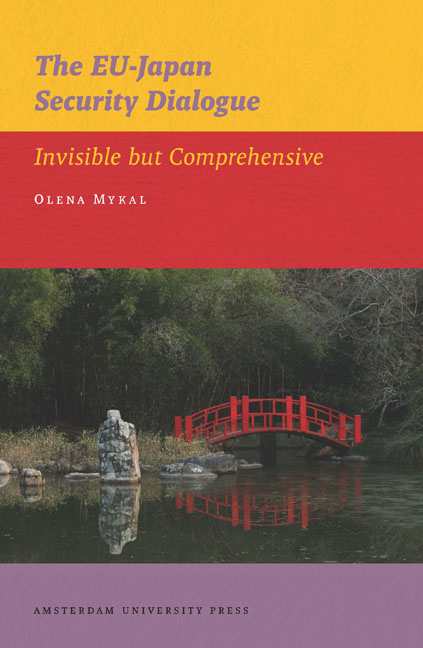Book contents
- Frontmatter
- Dedication
- Contents
- Abbreviations
- Acknowledgements
- Preface
- Introduction
- PART ONE DEVELOPING CONCEPTIONS OF SECURITY AND JOINT AGENDA OF THE EU-JAPAN SECURITY DIALOGUE
- PART TWO COMMON INTERESTS IN THE EU-JAPAN SECURITY DIALOGUE: ANALYSIS OF JOINT ACTIVITIES
- Conclusion
- About the Author
- Notes
- Bibliography
- Index
- Publications Series
4 - Comprehensive Endeavours to Preserve the Ecosystem: The EU-Japan Security Dialogue in the Environmental Area
Published online by Cambridge University Press: 22 January 2021
- Frontmatter
- Dedication
- Contents
- Abbreviations
- Acknowledgements
- Preface
- Introduction
- PART ONE DEVELOPING CONCEPTIONS OF SECURITY AND JOINT AGENDA OF THE EU-JAPAN SECURITY DIALOGUE
- PART TWO COMMON INTERESTS IN THE EU-JAPAN SECURITY DIALOGUE: ANALYSIS OF JOINT ACTIVITIES
- Conclusion
- About the Author
- Notes
- Bibliography
- Index
- Publications Series
Summary
The discourse analysis in part one demonstrated that the EU (then the European Community) and Japan established cooperation in the area of the environment in the late 1970s. Moreover, examination of the security conceptualisations of the EU and Japan in the Cold War period revealed that at that time both Europe and Japan were already concerned with environmental issues and included them in their security agendas (see chapter 1).
This chapter will focus on an examination of the EU and Japan joint performance on environmental issues. It will discuss what Japan and Europe have been doing jointly. We argue that there is a EU-Japan security dialogue on environmental issues that has been developing gradually and that is being reinforced and widened. To support this assertion, we will first analyse their initial cooperation efforts on environmental issues. Thus, we will reveal the driving forces and reasons for this cooperation and the significance of The Hague Declaration for the EU-Japan security dialogue on the environment. Moreover, we will trace the participation of both actors at the Rio Summit.
Second, we will analyse the development of their cooperation from the mid-1990s until the middle of the first decade of the 21st century. Here we will discuss the joint activities of Europe and Japan during their preparations for and conduct at the Kyoto Summit. We will also examine EU and Japanese endeavours to have the Kyoto Protocol ratified in a timely manner. We will also examine ‘An Action Plan’ and its significance for the dialogue. Finally, we will describe the current situation with regard to the security dialogue on environmental issues. In conclusion, as environmental cooperation is particularly important for the future of the planet, we will make some predictions with regard to the dialogue.
One more point should be mentioned here. It concerns the resources and literature related to the EU-Japan partnership on environmental issues. This chapter is chiefly based on bilateral documents and respective official sources from both Japanese and European sides. Regarding academic works, Julie Gilson's monograph Japan and the European Union: A Partnership for Twenty-First Century? mentions that ‘the area of environmental cooperation is of particular importance for the development of Japan-EU relations in the twenty-first century, incorporating as it does elements of both economic and non-economic concerns’ (Gilson 2000: 107).
- Type
- Chapter
- Information
- The EU-Japan Security DialogueInvisible but Comprehensive, pp. 131 - 142Publisher: Amsterdam University PressPrint publication year: 2012

